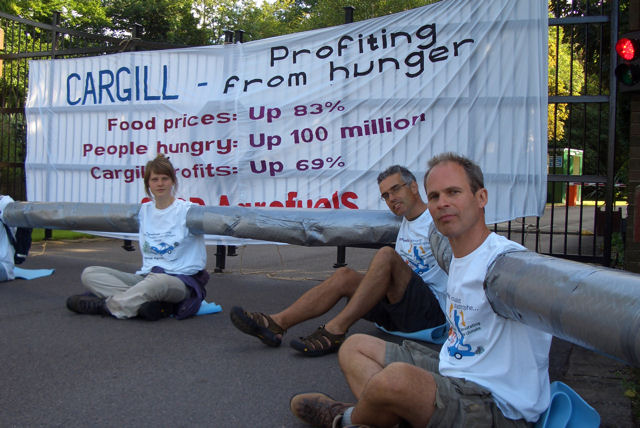 1.08.2008
1.08.2008
Since 7.50 am this morning, 20 participants in this year’s Camp for Climate Action and members of Action Against Agrofuels have been blockading the only access gate to Cargill’s European regional head office in Cobham, Surrey. 8 activists have locked on to the gates closing the site down completely. Agrobusiness giant Cargill are being targeted by the protesters for their role in rainforest destruction and land-grabbing as well as for profiteering from the food crisis.
Hannah Ritchie from the group says: “Cargill is using the boom in agrofuels to expand soya, palm oil and sugar plantations, displacing communities, food crops and destroying ecosystems. Destroying rainforests and other biodiverse ecosystems, including healthy soils, is one of the quickest ways of heating the planet. This is why we are blockading the Cargill office two days before the official start of the Climate Camp at Kingsnorth.”
According to the UN World Food Programme, 100 million more people are going hungry as food prices have risen by 83% in three years. At the same time, Cargill’s profits have risen to record levels, going up by 86% in just nine months, since the company is profiteering from high food prices.
Jordan Craig says: “For companies like Cargill, agrofuels are an opportunity to make more profits from food, to take over more land from small farmers and communities and to further destroy local food production. This is why we need an immediate halt to government policies such as the mandatory blending of petrol and diesel with biofuels in the UK, as well as an end to ‘free trade’ food and agricultural policies which solely boost the power and the profits of agribusinesses like Cargill. Instead of agrofuels, we need to have policies that support Food Sovereignty, i.e. which put people’s right to food first and support small-scale, biodiverse, organic farming, instead of energy-intensive agriculture.”
Contacts:
Participants in the action can be contacted at the following numbers 07527-124478 or 07964-068147
Notes:
1. Agrofuels are biofuels made from crops and trees grown on monocultures for that purpose.
2. Cargill owns 25% of shares in the UK’s biggest biofuel supplier, Greenergy International. They have major investments in US corn ethanol, Brazilian sugar cane ethanol, as well as palm oil and soya, and they are involved in joint ventures to develop GM agrofuels. Cargill is the world’s biggest grain trader, the biggest exporter of sugar cane and soybean from Brazil, the biggest soybean crusher in Paraguay and one of the world’s five largest palm oil traders.
3. For more information about the harm which Cargill is causing to communities and ecosystems in Brazil, Paraguay and Papua New Guinea, see http://understory.ran.org/wordpress/wp-content/uploads/2007/11/cargill_letter1.pdf
www.biofuelwatch.org.uk
